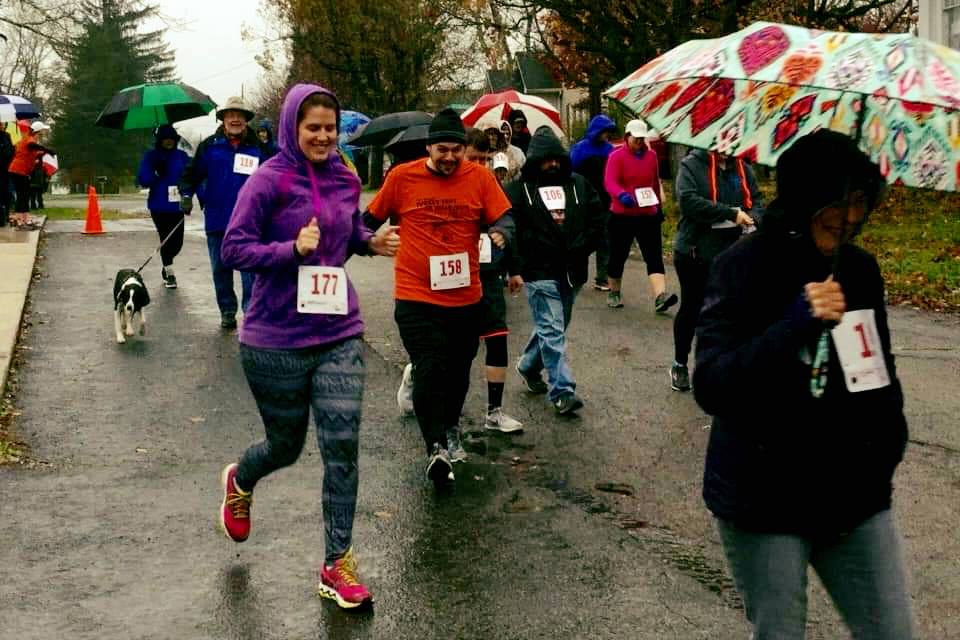Celebrating 10 Years of the Turkey Trot
It’s no secret we truly love the community we serve and it’s vital for us to give back to those around us, which is why 10 years ago we had the bright idea to assist some of the amazing organizations within our community who have worked tirelessly to combat food insecurity in Barbour County. We began helping with WDNE Radio’s “Feed the Need” program, but knew we wanted a tradition of our own. Thus, the Turkey Trot 5k Walk/Run was born. Taking place on the first Saturday of November, this fun run has become a staple within the community to kick off the holiday season.

From it’s conception, the Turkey Trot proceeds have been split 50/50 between the Heart and Hand House and the Belington Presbyterian Church, who both work hard to feed community members in need not just during the holiday season, but regularly throughout the year as well.
“I feel that this race embodies what our true goal is as a rural healthcare organization. The Turkey Trot not only promotes health and well-being among participants, but also provides a public service to those in our communities who may be struggling to get by, which is why the concept of this race holds steadfast to Barbour Community Health Association’s mission,” said Scott Nesland, PA-C. Scott has spearheaded the tenth annual run and is excited for it to activate community involvement to help friends and neighbors during a time of year that can be difficult for many.
The Heart and Hand House is a pillar in the community of Barbour County. They are a non-profit mission project affiliated with the United Methodist Church offering emergency services such as a food pantry, home repair & construction services, baby pantry and other limited financial services, along with community programs such as Christmas baskets, backpack programs, the Barbour County Community Garden Market, and two thrift stores within the county. The Turkey Trot helps to support their food pantry — which feeds hundreds of Barbour County families a year and is especially needed around the holiday season.
“It’s a good time of year to stop and think of others. Right before Thanksgiving, it’s important to think about what we’re thankful for and to raise awareness that there are people in the community who are struggling that we can help out,” says Brenda Hunt, Executive Director of the Heart and Hand House.
Just next door to our Belington Medical Clinic, is the Belington Presbyterian Church who also is on a mission to help those in need. During Thanksgiving the church feeds around 400 people between dine-ins, pick-ups and delivery meals. Not only do they help out on Thanksgiving Day, but they also offer a free lunch every third Saturday of the month, where they typically average 200-225 guests.
“The Turkey Trot has been a great asset to our church,” says Julie Feather, Belington Presbyterian Church Member and Volunteer, “The continuous support helps us to do the things we do for our community.”
We are so excited to be celebrating ten years of this beloved tradition of helping our friends and neighbors in need. Help us help our community, be sure to join us for the 10th Annual Turkey Trot 5k Walk/Run Saturday November 6th in Belington for a fun filled morning of exercise and giving back to our community. We will also be accepting donations of non-perishable food items at both our Philippi and Belington Wellness Centers and at our race!
GETTING TO KNOW KAITLIN JONES, PA-C: OUR NEWEST QUICK CARE PROVIDER
GETTING TO KNOW KAITLIN JONES, PA-C: OUR NEWEST QUICK CARE PROVIDER Barbour Community Health Association is always excited to welcome new team members who
Keep Your K-12 Child On Track with Annual Well-Child Visits
Keep Your K-12 Child On Track with Annual Well-Child Visits Children grow and change rapidly as they advance from toddlers to teens to young
Overcoming the Winter Blues: The Guide to Seasonal Depression Care
Overcoming the Winter Blues: The Guide to Seasonal Depression Care As the days grow shorter and colder, many people experience more than just the
